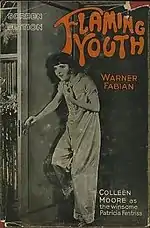Flaming Youth (novel)
Flaming Youth is a 1923 book, controversial in its time, published under the pseudonym "Warner Fabian", by Samuel Hopkins Adams.
 Cover of the 1924 film tie-in edition featuring Colleen Moore and published by The Macaulay Company | |
| Author | Samuel Hopkins Adams |
|---|---|
| Country | |
| Language | English |
| Genre | Novel |
| Published | 1923 (Boni & Liveright) |
| Media type | Print (hardcover & paperback) |
Context
In the 1920s, Adams wrote two novels, Flaming Youth and Unforbidden Fruit, dealing with the sexual urges of young women in the Jazz Age. These novels had a sexual frankness that was surprising for their time, and Adams published them under the pseudonym "Warner Fabian" so that his other works would not be tainted by any scandal.
Reception
In his retrospective essay "Echoes of the Jazz Age", writer F. Scott Fitzgerald argued that Adams' novel persuaded certain moralistic Americans that their young girls could be "seduced without being ruined" and thus altered the sexual mores of the nation.[1] The novel was adapted into the silent movie Flaming Youth in 1923. A reviewer for the Cincinnati Enquirer noted that the film was "far from being a faithful translation of the book on which it was based" since film censorship at the time would have required the elision of some scenes which appear in the novel.[2]
References
- Fitzgerald 1940, p. 17.
- "Critics Disagree on Flaming Youth: Merits of First National Film Doubted by Reviewers". Exhibitors Trade Review. New York: Exhibitors Review Publishing Corporation. 15 (7): 39. 12 January 1924. Retrieved 16 June 2022.
Sources
Further reading
- Fitzgerald, F. Scott. "Echoes of the Jazz Age (annotated)". Genius.com. Retrieved 17 August 2023.
The Stories of F. Scott Fitzgerald, Volume 2 (1965)
External links
- Flaming Youth at Project Gutenberg
- The full text of Flaming Youth at HathiTrust Digital Library
 Flaming Youth public domain audiobook at LibriVox
Flaming Youth public domain audiobook at LibriVox